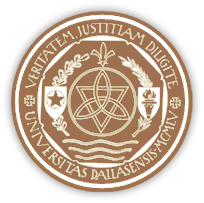Table of Contents: Volume 3, Issue 1
Volume Three
Editor-in-Chief: Peter S. Hermanson (PhD student, Philosophy)
Managing Editor: Adam Cooper (PhD student, Literature)
Editors:
Jennifer Fast (PhD student, Literature)
Franz Klein (PhD student, Literature)
John Douglas Macready (PhD student, Philosophy)
Tiffany Niebuhr (PhD student, Literature)
Faculty Advisor
Scott Crider
Faculty Review Board
John Alvis (Literature), Debra Baldwin (Literature),
Brett Bourbon (Literature), Jacob-Ivan Eidt (Modern Languages),
John Norris (Theology), Matthew Walz (Philosophy)
Ramify thanks the following faculty members for their support:
Jonathan Culp (Politics), Richard Dougherty (Politics), Mark Goodwin (Theology), Eileen Gregory (Literature),
Joshua Parens (Philosophy), Lance Simmons (Philosophy), Robert Wood (Philosophy)
Ramify thanks our financial supporters:
Braniff Graduate Student Association, Kent Feuerborn, President
Braniff Graduate School of Liberal Arts, David Sweet, Dean
Cover and book design: Robert Salazar.
ISSN 2158-5784
The Limits of Technological Interpretation: The Case of 1 Henry IV
by John C. Briggs
The Jewel in the River: Symbolic Vision in Delta Wedding
by Adam Cooper
Abstract:
This article explores Eudora Welty's poetic meditation in Delta Wedding by entering and (partially) mapping the novel's networks of images and themes, seeking to show and honor the value of its symbolic mode of presentation. At the novel's center, Ellen, mother of the young bride, appears as an example and type of the particular liberty and hiddeness that belong to a dedicated life. Ellen's special capability to lose (and find again) the things and persons that touch her life becomes a motif whose many modulations serve to reveal and concretely develop the basic spiritual movement of self-loss and -renewal, death and resurrection. Episodes foregrounding the “lost jewel” of her girlhood and the cluster of substituted meanings surrounding this emblem raise the motif of lost things returning to a high symbolic power. Through her encounters with her brother-in-law George, and through her relinquishing him to the fate towards which he seems self-driven, Ellen's care for her family and their Delta world shows a longing for apocalypse at its heart, even as it deepens in its embrace of human limits. Her encounter with George thus precipitates a “vision of fate” in which she confronts and renews the before-unfathomed renunciations inherent to her life, finding in them the paradoxical source of her freedom and peace. Ellen's affinity for the lost and found, finally, grows into a trope for the transmutation, through her life's intrinsic losses, of her own vital energies into the buried treasure of an entire community—an invisible source of blessing that lays the metaphysical ground for a communal-symbolic experience of life.
Jaffa’s Critique of Calhoun and the Conservative Civil War over the Civil War
by Nate Sheely
Abstract:
This article examines Harry Jaffa’s response to conservatives who champion the political philosophy of John C. Calhoun and criticize Abraham Lincoln. These critics find the seeds of the modern progressive movement in the thought and actions of Lincoln. Jaffa argues that progressivism actually has much more in common with the thought of Calhoun and other southern statesmen than it does with Lincoln’s political philosophy. The paper dissects the strengths and weaknesses of Jaffa’s critique of Calhoun.
Christ’s Obedient Slave: Paul's Use of Ethos in Romans 1: 1-17
by Jared R. Brown
Abstract:
Paul’s letter to the Romans is the most unique of the Pauline corpus. At the time of writing the letter, the Roman church had not met Paul, and he was probably only known to them by name. In his letter to the Romans, Paul lays out his gospel in a more detailed form than we find in any of his other letters. Paul writes the letter in order to establish a relationship with the Roman church and to gain their trust through establishing his ethos. Rhetorical criticism is the most appropriate route for understanding Paul’s use of ethos. Paul establishes his ethos under the title of apostle, which is an ambassadorial ethos of both authority and humility. Paul also demonstrates that his gospel is the same as theirs through establishing the ethos of his own gospel, which entails the ethos of both God and Jesus. Furthermore, Paul confirms the ethos of the Roman church. Paul’s use of ethos will prove advantageous when he attempts to unify the Roman church, to prepare the way for his visit, to ask for their aid in sending him to Spain, and to contribute to the Jerusalem collection by exhorting them to the obedience of faith.
Visual Artwork
by Sarah Francis
Athena as Founder and Statesman in The Eumenides of Aeschylus
by John Alvis
Poems
by Andrew Osborn
Futurity, Omniscience, and the End of History: A Vindication of Hegel’s Claim to Absolute Knowing
by Daniel H. Arioli
Abstract:
Hegel is a thinker more often caricatured than understood. Both his supporters and his detractors have been among the ranks of those who accuse Hegel of self-divinization, of constructing an all-encompassing historical framework and imagining himself to have achieved something like omniscience. Not only is this interpretation of Hegel incorrect, but it stands in stark opposition to Hegel’s own self-understanding as a philosopher. This paper, a defense of the Hegelian project, attempts to debunk the myth that Hegel saw his own accomplishments as an “end” of history, in anything like the ordinary sense of that word. The systematicity of historical development, for Hegel, makes comprehensible the conditions under which freedom and rationality can develop; it is patently not an attempt to interpret the past or the future deterministically. Hegel’s “historicism” is deserving of a critical, but charitable, re-evaluation.

